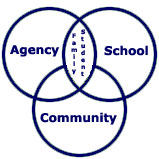Bill Derbyshire
Seasonal Affective Disorder, often referred
to as SAD, is a psychiatric disorder in the
category of Mood Disorders in the Diagnostic
Statistical Manual (DSM) - IV. Symptoms of SAD
are similar to Major Depression with the
exception that there is a distinct pattern of
onset of symptoms that correlates with a season
of the year, typically during the winter.
Symptoms of Major Depression include some or all
of the following:
- Depressed mood most of the day, nearly
every day
- Markedly diminished interest or pleasure
in all or almost all activities
- Significant weight loss when not dieting
or weight gain
- Insomnia
- Fatigue or loss of energy
- Feelings of worthlessness or excessive or
inappropriate guilt
- Diminished ability to think or
concentrate or indecisiveness nearly every day
- Recurrent thoughts of death or recurrent
thoughts of suicide.
- Signs of agitation as observed by others
If you have five or more of these symptoms
during a particular time of the year (usually
beginning in the fall and lasting into the
winter) year after year, then perhaps you suffer
from Seasonal Affective Disorder. Typically your
general physician can make this diagnosis;
however a psychiatrist is specifically trained
to assess mood disorders. Some licensed
psychologists, social workers, and professional
counselors can also assess for this disorder.
There are several potential forms of
intervention to help relieve the symptoms of
SAD. A primary approach, perhaps somewhat
preventive, is a holistic approach that includes
the following:
- Regular exercise - at least three times a
week, each time to include a minimum of 30
minutes of aerobic exercise (walk, run, swim,
bike, etc.)
- Drink no or very little alcohol - Alcohol
is a depressant
- Join activities that includes involvement
with others such as volunteer work
- Expose yourself to nature light as much
as possible
- Avoid activities where you are isolated
- Eat well balanced meals
- Participate in activities that provide
spiritual support
- Think about how the "glass is half
full" - think positive.
Other interventions can possibly include
light therapy, anti-depressant medication and
professional counseling. These interventions
should be discussed with a qualified and
licensed therapist or physician.
SAD can not necessarily be "cured"
but can be managed in such a way that the
symptoms become minimized.
If you have the winter blues, take charge and
become proactive. If you have any questions you
can call the Catoctin CASS office at
301-447-3611.
The next column will focus on school health
issues.
Read other articles by Bill Derbyshire
Return to Article
Index

